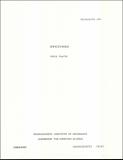| dc.description.abstract | Church's thesis equates the intuitive notion "effective" with the mathematical notion "recursive." In order for this thesis to provide any information to us we have to have a clear understanding of both notions. We consider one of the prevalent definitions of "effective" and compare it with the notions of syntatic and semantic consequence to see whcih one it corresponds to better. The notion of syntactic consequence, while useful, is subservient to the semantic notion and when we go from one language to another we expect to have to change the syntatic notion of conseuqnce, if we are lucky enough to have one at all. Similiarly the prevalent notion of effectiveness is a restricted one and has had the effect of limiting our view. At the end of section 3, we give a more general analysis of effectiveness and propose a mathematical theory. In section 4 we consider the question whether the set of grammatical sentences of English is recursive. We show that this question is not well posed and that the arguments in favour of a positive answer are question begging. We reformulate this question in the form "How recursive is the set of grammatical sentences of English?", and propose a way of turning it into a precise technical problem. The method used is a generalisation of the Kolmogorov-Chaitin theory of randomness which is briefly sketched. | en_US |
